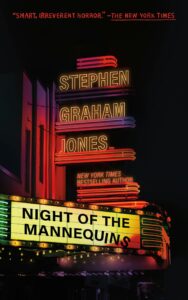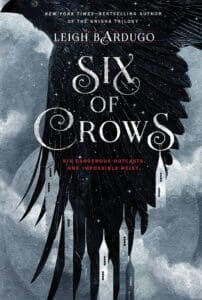
A little while back, I went to a book club bash at an indie bookstore where the bookseller’s presented their favorite books that they thought would make good book club reads. When I saw the flyer at the entrance, I assumed most of the books wouldn’t be for me. But these sellers were GOOD. When someone passionate talks about their favorite books, I’m immediately suckered in. I added every single book to my TBR that night. This is the first one I’ve read from that list. Be warned though. I didn’t realize I had this many thoughts about it until I sat down to write this post.
Synopsis
The Salpêtrière Asylum: Paris, 1885.
Dr. Charcot holds all of Paris in thrall with his displays of hypnotism on women who have been deemed mad and cast out from society. But the truth is much more complicated–these women are often simply inconvenient, unwanted wives, those who have lost something precious, wayward daughters, or girls born from adulterous relationships. For Parisian society, the highlight of the year is the Lenten ball–the Mad Women’s Ball–when the great and good come to gawk at the patients of the Salpêtrière dressed up in their finery for one night only. For the women themselves, it is a rare moment of hope.
Genevieve is a senior nurse. After the childhood death of her sister Blandine, she shunned religion and placed her faith in both the celebrated psychiatrist Dr. Charcot and science. But everything begins to change when she meets Eugenie, the 19-year-old daughter of a bourgeois family that has locked her away in the asylum. Because Eugenie has a secret: she sees spirits. Inspired by the scandalous, banned work that all of Paris is talking about, The Book of Spirits, Eugenie is determined to escape from the asylum–and the bonds of her gender–and seek out those who will believe in her. And for that she will need Genevieve’s help . . .
Review
As I said above, every single book on that list sounded awesome when introduced by the right person. This one though was at the very top of the list. Historical, feminist, dark, and mental health? Count me in.
“Dreams are dangerous things, Louise. Especially when they depend on someone else.”
This story was really compelling and atmospheric. It’s a rather short book and I devoured it as quickly as I could. I don’t know how many lines I highlighted but I really wish I had read it in print so I could flip through it in the future for some of the quotes that stood out to me. The focus was definitely on the women, their loyalty, their deceit, their betrayal. Their hopes and dreams and fears. But especially their exploitation and man’s wish to erase anything deemed inconvenient, even if it meant a life behind walls for their family members.
“The Salpêtriére is a dumping ground for women who disturb the peace. An asylum for those whose sensitivities do not tally what is expected of them. A prison for women guilty of possessing an opinion.”
I had some extremely visceral reactions to some of the scenes in this book. I was immediately drawn to one of the POVs in particular and so eager to find out more about her life. The betrayal she suffered felt incredibly personal even to me. I was devastated for her. I also cheered for another character once I realized the transformation she was going through. That one was so satisfying to watch.
“Often the truth is not better than a lie. In fact, our choice is never between truth and lies, but between the consequences that will follow each one.”
Though the time passes slowly in the story, the plot never felt like it dragged. There was always something that kept me glued to the pages, whether it was in disbelief, in awe, or in anger. Despite that though, I still felt like I was being kept at a distance due to the writing style. While I did have a lot of feelings while reading, it was more at the actions of the people than due to the emotional depth of the story. I generally prefer to dive deeper into the psyche of characters and would’ve loved more exploration of their feelings, motivations, and histories. I’m sure that would’ve made this book even darker and I do believe not doing so makes this a more accessible story than it would’ve been otherwise. And it is a story that I think should be shared around more. Yes, it is history from a while ago, but I do still think there are issues that still need to be addressed today. We haven’t progressed as much as we would like to think, especially when it comes to healthcare for women.
“Those who meet here are not equals: the doctor announces the fate of the patient; the patient takes him at his word. For the doctor, what is at stake is his career; for the patient, it is life itself. This rift is all the more pronounced when a woman enters the consulting room.”
I also sometimes felt like using present tense and omniscient narration pulled me out of the story here and there. This might be the curse of the proofreader/editor, but it didn’t always feel consistent in its use of either. It made me remember my experience with The Witcher and I wondered whether it being a translation affected this. After reading in two different languages and seeing the effects a translation can have on a story, I always wish I could read every book in their original language, the one the author is probably more comfortable in and able to do more beautiful things with. Sometimes it was neat to get extra details we wouldn’t have gotten with a close third narration, but sometimes it also felt jarring to get a history lesson or jump to another character without any warning. I also believe that is what made me feel like I was being kept at a distance emotionally as a reader. I just wasn’t as close to the characters as I like to be.
“Unswerving faith in any idea inevitably leads to prejudice. Have I told you how calm I feel since I began to doubt? What is important is not to have beliefs, but to be able to doubt, to question anything, everything, even oneself. To doubt.”
This is the first book I started and finished in 2025 and I can’t complain at all. This is the kind of experience I wish I had with more books. It made me feel and think while reading and after. A book doesn’t have to be perfect for me to appreciate having experienced it and despite the criticism I have for it, I very much enjoyed it overall and definitely recommend it to you all!









Leave a Reply